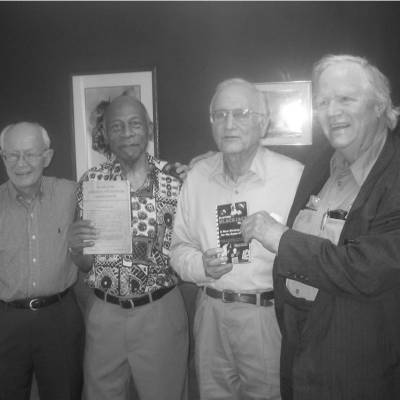
Roger Baldwin
Childhood
Roger Rauschenbusch Baldwin was born in 1929 in Manhattan to economist Stephen Raushenbush and social reformer Evelyn Preston. After his parents' divorce, he was adopted by his stepfather, Roger Nash Baldwin, the founder of the American Civil Liberties Union (ACLU)8. Growing up in Greenwich Village, Baldwin was exposed to intellectual and progressive influences early on. He later pursued higher education at Cornell University and Columbia University, earning a master’s degree in mathematics.
Career
While serving in the U.S. Army in the early 1950s, Baldwin was stationed at Aberdeen Proving Ground. During a casual poker game, a fellow soldier mentioned how dealers in Las Vegas were required to stand on 17 and hit on 16. Intrigued, Baldwin teamed up with three other mathematically inclined soldiers—Wilbert Cantey, Herbert Maisel, and James McDermott—to analyze blackjack probabilities.
Using only desk calculators (adding machines), the group spent months computing the optimal decisions for every possible hand. Their findings, published in the Journal of the American Statistical Association (1956) and later in the book Playing Blackjack to Win (1957), introduced the world to Basic Strategy—a mathematically proven method to minimize the house edge.
Their work caught the attention of Edward O. Thorp, who later refined their system using computers and published the groundbreaking Beat the Dealer (1962), the first book to prove blackjack could be beaten with card counting.
Personal life
Baldwin led a relatively private life outside of gambling. After his military service, he worked as a systems administrator for Union Carbide, Brookhaven National Laboratory, and the City of New York. He remained modest about his blackjack fame, once telling The Tech (MIT’s newspaper) that his knowledge of the game "ended with the first edition of Beat the Dealer."
He passed away on January 10, 2021, at the age of 91, as the last surviving member of the Four Horsemen.
Revenue
While Baldwin himself did not profit directly from gambling, his Basic Strategy became the foundation for:
- Professional blackjack teams (e.g., MIT Blackjack Team)
- Modern card-counting systems (e.g., Hi-Lo, KO Count)
- Casino rule changes (e.g., switching from single-deck to multi-deck games)
- Inspired by Baldwin's work, Thorp’s Beat the Dealer sold over 700,000 copies and forced casinos to adapt their rules temporarily.
Interesting facts
- The "Four Horsemen of the Apocalypse" – Gambling author Dr. Allan N. Wilson coined this nickname for Baldwin’s team in 19658.
- Inducted into the Blackjack Hall of Fame (2008) – Recognized alongside legends like Edward Thorp and Stanford Wong.
- Never a Professional Gambler – Unlike Thorp or the MIT Team, Baldwin never used his strategy in casinos.
-
Basic Strategy is Still Used Today – Modern simulations show their 1957 method was 99.9% accurate compared to today’s computer-optimized strategies.
Legacy
Baldwin’s contributions fundamentally changed blackjack:
- Proved blackjack could be analyzed mathematically
- Inspired Thorp’s card-counting revolution
-
Laid the groundwork for advantage play
Frequently asked Questions
No, Baldwin never played professionally. His work was purely mathematical, and he pursued a career in systems administration.
Modern simulations show it was 99.9% accurate—losing only a fraction of a percent compared to today’s optimal strategies.
The nickname, given by gambling author Dr. Allan N. Wilson, symbolized how their strategy threatened casinos’ profits.
Yes—after Thorp’s Beat the Dealer (based on their research), many casinos switched to multi-deck games to counter card counters.
Proving that blackjack could be beaten mathematically, paving the way for modern advantage play.
















